Basics
Unlike most card games, the variant of Krutzjass is not played with a 52 card deck. It is played with a 48 card deck, consisting of only 6 denominations: 9, 10, Jack, Queen, King and Ace. In the deck there are two cards of every denomination, so that, for example, it is possible to have 2 nines of spades in one's hand.
Like Euchre and bridge, trump does appear in Krutzjass, and trump affects the relative power of certain cards. In a non-trump suit, Aces are high, with cards descending in power in the normal fashion. However, in trump, the hierarchy is as follows, from high to low: Jack, 9, Ace, King, Queen, 10. Also, in trump a 9 is referred to as a knell, and a Jack as a Bauer. Unlike in Euchre, there is no such thing as a left bauer, furthermore a trump must be called.
The deal
After being cut by the player to the left of the dealer, the hands are dealt in counter-clockwise order, with the cards dealt either three or four at a time depending on personal preference. Once the dealer has dealt all the cards, the person to the right of the dealer makes trump. If he has four suits but is unable to make trump, he may pass to his partner. If he has less than four suits in his hand, he may not pass. Furthermore, once the bid has been passed once, it may not be passed again. The next hand is dealt by the player to the right of the previous dealer.
The Wiese
On the playing his or her first card, any player may declare a Wiese, by stating the number of points, or in the case of a 3-of-a-kind the word three. The Wieses are as follows:
- 200: A jack in every suit
- 150: A nine in every suit
- 100: a run of 5 or more, OR having 4 of a kind (other than Js and 9s), where none of the 4 cards are of the same suit.
- 50: a run of 4
- 20: a run of 3
Whoever Wieses the highest point value must prove they have the cards by placing the cards specified in the wiese on the table, as well as any other point combinations they may have handy. Their partner may do likewise if they have any point combinations. Only the winner of the wiese may earn points for their combinations. This means that if North had a 50 and East had 100, North's 50 would not be counted, while East's 100 (provided south could not beat it) would be counted.
If two players on opposite teams Wiese the same amount, four factors are used to determine who won the Wiese:
- In the case of 100, a 5 card run beats a 4-of-a-kind, and a 6-card run is better than both.
- In the case of a run, the run containing the highest card (in rank from low to high 9-Ace) wins.
- In the case two runs which are identical in denomination, a Wiese in trump is superior to a Wiese which is not.
- If factors 1-3 have not ruled a victor, the player who Wiesed first wins.
Play
The actual play consists of twelve tricks. The first card of the first trick is led by the player to the right of the dealer, and each player plays one card in counter-clockwise order, until all players have played once. The player who wins the trick leads the first card of the next trick.
The highest trump wins the trick. If no trump is played, the highest card of the suit led wins the trick. If two players play the same card, the card which is put down later supersedes the one played first. Thus, if an Ace is led, the second ace of the same suit may take it. Therefore, if North leads the Bauer, West can still win the trick by playing a second Bauer, which, by virtue of being played later than the first Bauer, takes it. Caution is needed when playing powerful cards.
If a player has both the King and the Queen of Trump, he or she may, on the trick when the player no longer has either card in their hand, declare Stëch (meaning Take), at which point, their team is awarded 20 points. If a player knows they have the largest remaining card in a suit, he or she may declare Böch, signifying that it cannot be taken without the intercession of trump.
A player must follow suit, with three exceptions:
- If a player has trump, they may play trump instead of following suit. This means that, even if South has a 9 of Hearts, he may play a trump on West's Ace of Hearts.
- If a player has no cards of the suit led, they may play a different suit.
- If trump is led, a player having no trump except bauers may choose to play a different suit. This exemption applies only to bauers.
Scoring
Along with Stëch and Wiese, a team scores points for the cards contained in the tricks they have won. In every hand, there are 310 available points to be won. The point values for cards are as follows:
- 9: 0 points
- 10: 10 points
- Jack: 2 points
- Queen: 3 points
- King: 4 points
- Ace: 11 points
- Knell: 14 points
- Bauer: 20 points
The team winning the last trick gains 6 additional points. If a team takes every trick, they are awarded a much, which is worth 190 points. The first team to accumulate 1500 points wins the game.

Pinochle, also called pinocle or penuchle, is a trick-taking, Ace-Ten card game typically for two to four players and played with a 48-card deck. It is derived from the card game bezique; players score points by trick-taking and also by forming combinations of cards into melds. It is thus considered part of a "trick-and-meld" category which also includes the game belote. Each hand is played in three phases: bidding, melds, and tricks. The standard game today is called "partnership auction pinochle".

Sheepshead or Sheephead is an American trick-taking card game derived from Bavaria's national card game, Schafkopf. Sheepshead is most commonly played by five players, but variants exist to allow for two to eight players. There are also many other variants to the game rules, and many slang terms used with the game.
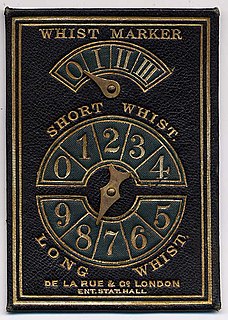
Whist is a classic English trick-taking card game which was widely played in the 18th and 19th centuries. Although the rules are simple, there is scope for scientific play.
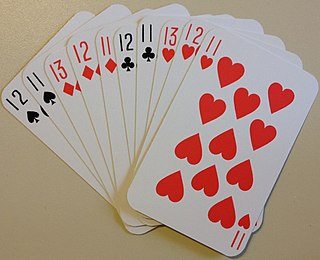
500 or five hundred, also called bid Euchre is a trick-taking game that is an extension of euchre with some ideas from bridge. For two to six players, it is most commonly played by four players in partnerships, but is sometimes recommended as a good three-player game. It arose in America before 1900 and was promoted by the United States Playing Card Company, which copyrighted and marketed the rules in 1904. 500 is a social card game and was highly popular in the United States until around 1920 when first auction bridge and then contract bridge drove it from favour. 500 continues to enjoy popularity in Ohio and Pennsylvania, where it has been taught through six generations community-wide, and in other countries: Australia, New Zealand, Canada (Quebec) and Shetland. The originator of Five Hundred, US Playing Card Company of Cincinnati, Ohio, now has headquarters across the Ohio River in Erlanger, Kentucky. Five hundred is promoted by some as the national card game of Australia.

Euchre or eucre is a trick-taking card game commonly played in Australia, Canada, New Zealand, Great Britain, and the United States. It is played with a deck of 24, 28, or 32 standard playing cards. Normally there are four players, two on each team, although there are variations that range from two to nine players.

Spades is a trick-taking card game devised in the United States in the 1930s. It can be played as either a partnership or solo/"cutthroat" game. The object is to take the number of tricks that were bid before play of the hand began. Spades is a descendant of the Whist family of card games, which also includes Bridge, Hearts, and Oh Hell. Its major difference as compared to other Whist variants is that, instead of trump being decided by the highest bidder or at random, the Spade suit always trumps, hence the name.

Forty-Fives is a trick-taking card game that originated in Ireland. The game is popular in many communities throughout Atlantic Canada as well as the Gaspé Coast in Québec. Forty-fives is also played in parts of Massachusetts and southern New Hampshire in New England, United States, as well as in the South Island of New Zealand.
Pedreaux is an American trick-taking card game of the All Fours family based on Auction Pitch. Its most popular variant is known as Cinch, Double Pedro or High Five. Developed in Denver, Colorado, in the 1880s, it was soon regarded as the most important member of the All Fours family. Although it went out of fashion with the rise of Auction Bridge, it is still widely played on the western coast of the United States and in its southern states, being the dominant game in some locations in Louisiana. Forms of the game have been reported from Nicaragua, the Azores, Italy and Finland. The game is primarily played by four players in fixed partnerships, but can also be played by 2–6 individual players.
Pitch is an American trick-taking card game derived from the English game of All Fours. Historically, Pitch started as "Blind All Fours", a very simple All Fours variant that is still played in England as a pub game. The modern game involving a bidding phase and setting back a party's score if the bid is not reached came up in the middle of the 19th century and is more precisely known as Auction Pitch or Setback. Whereas All Fours started as a two-player game, Pitch is most popular for three to five players. Four can play individually or in fixed partnerships, depending in part on regional preferences. Auction Pitch is played in numerous variations that vary the deck used, provide methods for improving players hands, or expand the scoring system. Some of these variants gave rise to a new game known as Pedro or Cinch.

Bid Euchre, Auction Euchre, Pepper or Hasenpfeffer, is the name given to a group of card games played in North America based on the game Euchre. It introduces an element of bidding in which the trump suit is decided by which player can bid to take the most tricks. The primary differences are the number of cards dealt, absence of any undealt cards, the bidding and scoring process, and the addition of a no trump declaration. It is typically a partnership game for four players, played with a 24, 32 or 36-card pack, or even two decks of 24 cards each. It should not be confused with another game also called Bid Euchre q.v. Five Hundred.
Sixty-three is a card game popular in Charlotte County, New Brunswick, and on Cape Breton Island, Nova Scotia, and is named after the number of points which can be taken in a hand. This game is nearly identical to the Pitch variant Pedro. It also has features reminiscent of Euchre.
Sueca is a 4 player-partnership point trick-taking card game of the Ace-Ten family, and a popular variant of the Bisca card game. The game is played in Portugal, Brazil, Angola and other Portuguese communities. Its closest relative is the very similar German game Einwerfen.
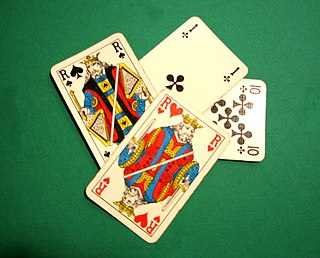
Evansville Clabber is a four-player trick-taking card game that is played in southwestern Indiana near Evansville. Clabber is a member of the Jack-Nine family of trick-taking card games that are popular in Europe. The game is a four player variation similar to that of klaberjass. The game also plays similar to Euchre, with a few differences being that points are not awarded based on the number of tricks taken, but rather on the actual point value of cards in those tricks. Clabber also doesn't use a left Bower, as does Euchre; other differences are that players don't use Bidding, instead, the trump makers must score at least eighty-two points to keep from "going set", where they don't score any of their points. Additional points can also be scored for a combination of cards in a hand, which would assist in "making it", or, not going set.
Smear is a North-American trick-taking card game of the All Fours group, and a variant of Pitch (Setback). Several slightly different versions are played in the Upper Peninsula of Michigan, Minnesota, Northern and Central Iowa, Wisconsin and also in Ontario, Canada.

Euchre is a 19th-century trick-taking card game and has many variations.
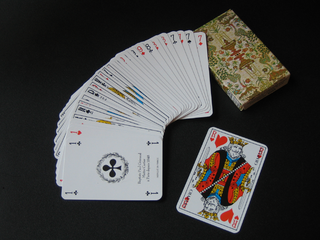
Manille is a French trick-taking card game which uses a 32 card deck. It spread to the rest of France in the early 20th century, but was subsequently checked and reversed by the expansion of Belote. It is still popular in France and the western part of Belgium.
Pluck is a trick-taking playing card game for four players. The game is played similar to Spades and Hearts. A standard deck of playing cards is dealt out evenly among the players. The objective is to get ten points before the other team.

Euchre has many variations in game playing. Some of them are designed for two, three, five or more players. Below is an incomplete list of major notable variations of the game.
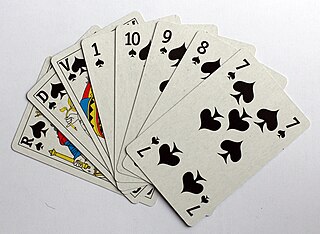
Triomphe, once known as French Ruff, is a card game dating from the late 15th century. It most likely originated in France or Spain and later spread to the rest of Europe. When the game arrived in Italy, it shared a similar name with the pre-existing game and deck known as trionfi; probably resulting in the latter becoming renamed as Tarocchi (tarot). While trionfi has a fifth suit that acts as permanent trumps, triomphe randomly selects one of the existing four suits as trumps. Another common feature of this game is the robbing of the stock. Triomphe became so popular that during the 16th century the earlier game of trionfi was gradually renamed tarocchi, tarot, or tarock. This game is the origin of the English word "trump" and is the ancestor of many trick-taking games like Euchre and Whist.
Juckerspiel, also known as Jucker or Juckern, is a card game that was formerly popular in the Alsace region. It is purported to be the ancestor of Euchre and to have given its name to the playing card known as the Joker. No definitive rules are known.










